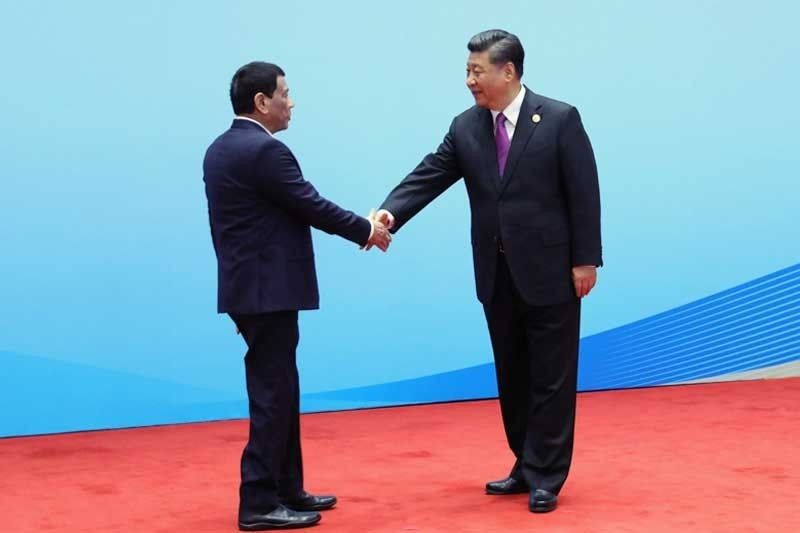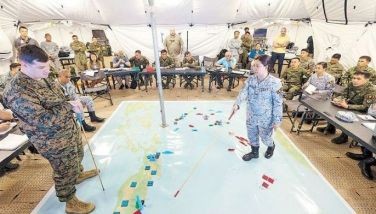Duterte bent on raising SCS ruling with Xi

MANILA, Philippines — China’s refusal to recognize the arbitral ruling on the South China Sea would not deter President Duterte from invoking the landmark decision during his visit to China this month, Malacañang said yesterday.
The 2016 arbitral ruling by a Hague-based court invalidated China’s expansive maritime claim in the South China Sea and upheld the Philippines’ rights over its 200-nautical mile exclusive economic zone (EEZ).
Duterte has vowed to bring up the ruling when he meets with Chinese President Xi Jinping later this month. Chinese Ambassador Zhao Jianhua has stressed that China, which claims virtually the entire South China Sea, would not recognize the ruling.
Senate Minority Leader Franklin Drilon yesterday dismissed these pronouncements and said it should prompt the government to be proactive in calling out China.
“All the more that the Philippine government must be more proactive in filing diplomatic protest against China. Whether China accepts the ruling or not, the Philippines should continue to fight for our rights by virtue of the arbitration award,” Drilon said.
Presidential spokesman Salvador Panelo, however, said it was China’s right not to budge from its position.
“That’s the way it is. But that will not stop the President from raising the issue of the arbitral ruling,” Panelo said in a radio interview.
Panelo also expressed confidence that the Duterte administration would achieve its objectives by holding negotiations with China.
“As I have repeatedly said, we are resorting to a friendlier network of settling differences which is negotiation. What we cannot get by invoking (the ruling), we might be able to do so through talks. Asserting something as a matter of right and principle is different from talking as friends,” the spokesman said.
Duterte, who has been tapping Chinese loans to support his key infrastructure projects, has been accused of being too soft on China and not doing enough to protect the Philippines’ rights in the West Philippine Sea.
Critics have claimed that Duterte’s policy on China could erode the Philippines’ legal victory in The Hague and embolden Beijing to continue its aggressive actions in the West Philippine Sea.
Duterte has assured the public that he would not give up even an inch of Philippine territory to foreigners. However, he warned that an aggressive stance on the dispute could lead to a conflict and “massacre” of Filipino soldiers.
Joint exploration
Duterte is also expected to discuss a proposed joint exploration in the West Philippine Sea during his fifth visit to China this month. The Philippine leader said he was open to a 60-40 sharing agreement in favor of the Philippines.
Vice President Leni Robredo said the proposed joint exploration should not be done in waters within the country’s exclusive economic zone.
“It is in our Constitution that when it is within our EEZ, that’s exclusive for Filipinos. We don’t know, however, where the (joint exploration) will take place, that’s why we want the discussion (between President Duterte and Chinese President Xi) to be transparent,” she said in a radio interview yesterday.
Robredo said she was informed by fishermen in Occidental Mindoro that there are more Chinese than Filipinos fishing in Reed Bank, which is within the Philippines’ EEZ.
Robredo said the discussion with Xi on the matter was long overdue. “The Filipinos are all waiting for its outcome,” she said.
Panelo assured the public that the joint exploration would not be disadvantageous to the Philippines.
“They offered a 60-40 (scheme). How can that be disadvantaegous? Second, the ambassador of China said they won’t ask for a share that is bigger than that of the Philippines,” Panelo said.
“We can use that as a bargaining leverage, you can say, ‘After all, it’s ours although you are claiming it, why can’t we just talk about the exploration so both of us can benefit?” he added.
Fisherfolk group Pambansang Lakas ng Kilusang Mamamalakaya ng Pilipinas (Pamalakaya) yesterday opposed the 60-40 sharing scheme in the joint explorations, branding it as a “sellout.”
Panelo, however, said the Philippines’ willingness to enter into a joint exploration deal with China reflects its ownership of the area to be covered by the agreement.
“When you are an owner of something, you can precisely enact what you are supposed to perform... In other words, that very act alone shows that you are the owner because you allowed it. If you are not the owner, how can you give permission on a particular thing if you do not own it?” he said.
Duterte and Xi signed a memorandum of understanding on the proposed joint exploration last November.
Last month, Energy Secretary Alfonso Cusi said the Philippines and China were seeking to craft a framework for the joint exploration in the disputed waters by November. The government, Cusi said, is also working on lifting the moratorium on exploration and drilling works implementedd in 2014 and 2015.
Foreign Affairs Secretary Teodoro Locsin Jr. said he has accepted China’s proposed terms of reference, describing it as “superior” to that of the Philippines.
Duterte is also expected to press China on the long-delayed binding code of conduct for South China Sea claimants this month.
In 2002, China and the Association of Southeast Asian Nations signed the Declaration on the Conduct of Parties in the South China Sea to ensure that maritime disputes are settled peacefully.
Nearly 17 years have passed since the declaration was approved but the claimants have yet to come up with a binding code.
‘Raise Chinese incursion in Phl’
Drilon said Duterte should also raise in his meeting with Xi the continued incursion of Chinese vessels into Philippine territory.
He said the growing presence of Chinese vessels in the country’s exclusive economic zone has become alarming, and urged his fellow senators to look into the issue.
“The presence of Chinese vessels into our territories is alarming. What is more alarming is that nobody knows what these ships are doing in our territory; even the government is clueless. They should not have crossed our EEZ in the first place. China must be made to explain,” Drilon in a statement.
Malacañang, meanwhile, said it was open to seeking help from the United States to monitor Chinese vessels in the Philippines’ EEZ in the wake of concerns over the reported passage of two Chinese warships through Sibutu Strait without clearance.
Panelo noted that the Philippines has a defense treaty with the US, its traditional ally.
“There’s nothing wrong with that. I think we are doing something so we can have our own satellite resources. While we do not have one, that’s part of a treaty,” Panelo said, referring to the Mutual Defense Treaty signed by Manila and Washington in 1951.
The treaty allows the two countries to jointly develop their security capabilities to counter external armed attacks.
Defense Secretary Delfin Lorenzana raised the idea of seeking assistance from the US last week as he expressed concern over the passage of Chinese ships through Sibutu Strait in Tawi-Tawi without informing the Philippine government.
There were at least four instances when Chinese ships passed through the strait in the Philippines’ southern tip since February, according to the defense chief. The Chinese ships reportedly turned off their automatic identification systems to avoid being detected by Philippine authorities.
The United Nations Convention on the Law of the Sea allows “innocent passage” of ships through a coastal state’s territorial sea. UNCLOS described innocent passage as “continuous and expeditious” and “not prejudicial to the peace, good order, or security of the coastal state.”
Also last week, Ryan Martinson, an assistant professor at the US Naval War College, said two Chinese survey ships were seen operating within the Philippines’ EEZ. The ships have been operating in the area since Aug. 3, he said.
Courtesy among ‘friends’
The Department of Foreign Affairs has filed diplomatic protests over the presence of Chinese ships in Philippine waters, but Panelo said they could not say how many of the protests have been answered by China.
“What is important is we filed (protests). It’s up to them how they will deal with it,” the presidential spokesman said.
Panelo said there should be courtesy among two friendly countries but admitted that it’s not that simple in the case of the West Philippine Sea row, stressing that the best way to solve the dispute is to talk it out like friends.
Asked if Malacañang sees sincerity in China’s friendship with the Philippines, Panelo said it remains unknown whether the Chinese government is aware of the passage of Chinese ships through Philippine waters. – With Helen Flores, Ding Cervantes
- Latest
- Trending




























